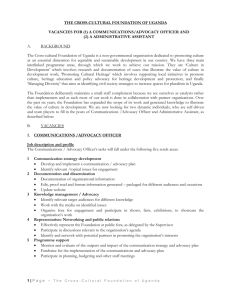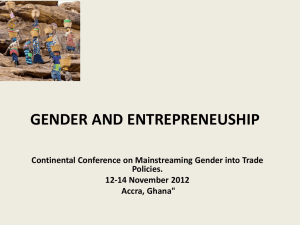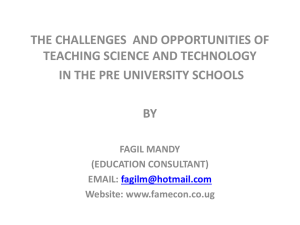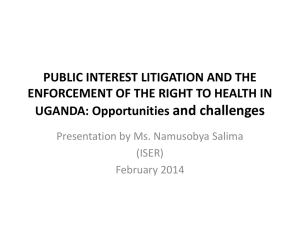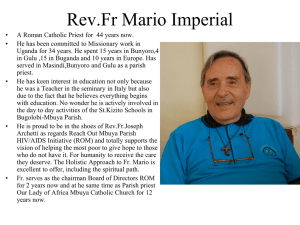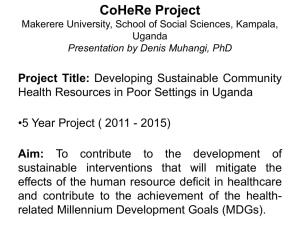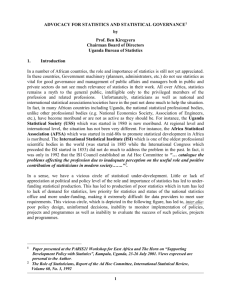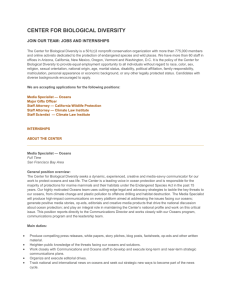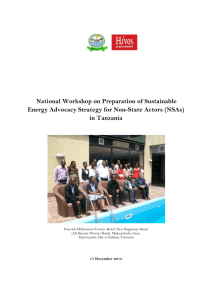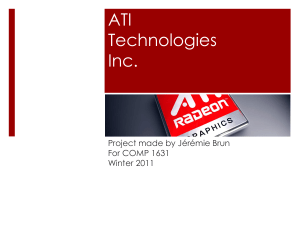Freedom of Information Requests-EM
advertisement
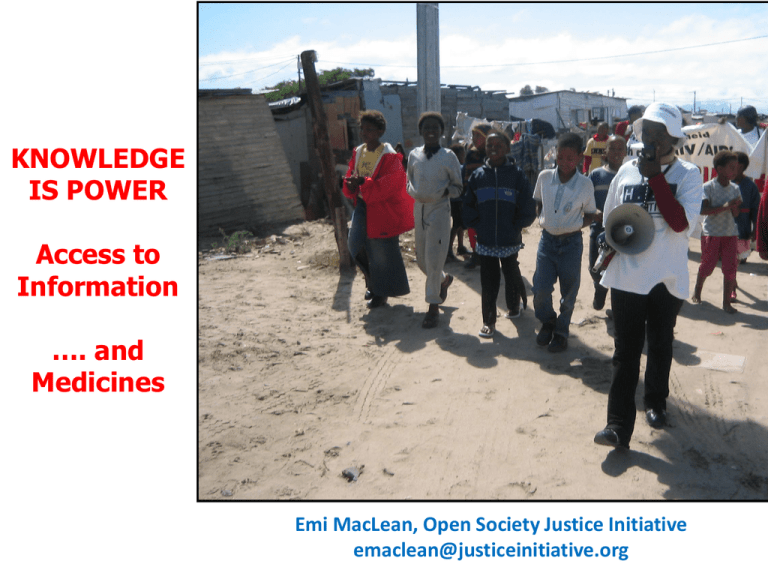
KNOWLEDGE IS POWER Access to Information …. and Medicines Emi MacLean, Open Society Justice Initiative emaclean@justiceinitiative.org DISCLAIMER: A selfish admission…. INFORMATION AS A TOOL, NOT AS THE END! Transparency to what end? Accountability Social Justice Policy Change Access to Medicines KNOWLEDGE IS POWER Countering the Secrecy • Pharmaceutical companies with undue access to, and influence over, WHO processes • US and UK push to keep WHO out of IP issues • US strongarms Guatemalan government to impose data protection equivalent to US IP law • Pfizer attempts to blackmail Nigerian attorney general to drop lawsuits related to drug trial which led to the deaths of children You don’t need to storm the building or wait for a Wikileaks document dump… 1. Figure out what information would be useful to advance your campaign: both substance and process. 2. Do the background research to know with specificity what information you need, and what information exists, and to justify your request for information. [Example of “Stop Stock-outs Campaign”.] 3. Determine who has the information and on what grounds you have the right to have access to the information. 4. Ask for the information. Follow up. Follow up again. 5. Bring a legal challenge to get access to the information, if that is strategic – and possible. This should be coupled with media pressure, grassroots activism, and other forms of advocacy. 6. Make use of the information if and when it is available. WE WANT THE INFORMATION … … BUT WE ALSO SEE THE STRATEGIC CAMPAIGNING VALUE IN CALLING OUT SECRECY “THE SECRET TREATY” Oil find 'enough for Uganda‘ - The Guardian Who will benefit…? Write down three types of information that your government – or another government – has that you want to know for your advocacy. (If you’re in South Africa, you can also include information that corporations have that you want to know.) MAKING THE LAW WORK! What is the legal basis for the right to information in southern and east Africa? Treaties & Other Int’l Commitments African Charter on Human & Peoples Rights (1986) Article 9(1): Every individual shall have the right to receive information. Dec of Principles on FOE in Africa (2002) Public bodies hold information … as custodians of the public good and everyone has a right to access this information, subject only to clearly defined rules established by law. Principles defining the right to information: right to information held by public bodies; and by private bodies where necessary for the exercise or protection of a right; right to appeal to an independent body and/or the courts; duty to publish important information proactively; no sanction for good faith release; for release of info re wrongdoing; or disclosure of serious threat to health, safety or environment. Constitutional Protections 15 countries with explicit guarantee of the right to info South – DRC, Madagascar, Malawi, Mozambique, South Africa West – Burkina Faso, Cameroon, Cape Verde, Ghana, Guinea Bissau, Senegal East – Eritrea, Kenya, Tanzania, Uganda 19 countries guarantee limited right to “receive info” as part of right to freedom of expression South – Angola, Botswana, Lesotho, Mauritius, Namibia, Swaziland, Zambia, Zimbabwe West – Liberia, Mali, Nigeria, Sierra Leone, Togo East, Central and North Africa – Chad, CAR, Ethiopia, Kenya, Tanzania, Morocco Setback: Zambian Constitutional Conference deleted RTI from Feb 2010 draft Constitution Uganda Constitution (Art. 41) Every citizen has a right of access to information in the possession of the state or any other organ or agency of the state except where the release of the information is likely to prejudice the security or sovereignty of the state or interfere with the right to privacy of any other person. Right to Info Laws 5 countries South Africa: Promotion of Access to Public Info Act 2000 Uganda: Access to Information Act 2005 Angola: Law on Access to Documents held by Public Authorities 2006 Ethiopia: Mass Media and Freedom of Information Act 2008 Liberia: Freedom of Information Act 2010 Plus Zimbabwe… Zimbabwe: Access to Information and Protection of Privacy Act 2002 Laws (continued) RTI bills not yet law Nigeria and Sierra Leone - imminent passage expected Rwanda; Sudan; Zambia – bills pending Ghana; DRC; Malawi; Mozambique; Kenya; Tanzania; Algeria; Morocco – bills not yet tabled Other laws with RTI provisions Archives Laws Evidence and Administrative Codes Civil and Criminal Procedure Codes Anti-Corruption Extractive Industries Transparency Initiatives Environmental Impact Assessment MORE THAN WORDS… New laws: Their significance will be proven by whether and how they are used by the people. And whether the government is obligated to abide by them. Some Ways to Advance the Issue Information Requests to Governments (or in South Africa, to corporations) … and public and media advocacy, parliamentary appeals, etc. Where needed and desired: litigation before domestic or regional courts AU Rapporteur on FOE and ATI Monitors and advises states re: compliance with ATI standards; can make public statements Civil Society Orgs – Intl & Africa Africa Freedom of Info Centre (AFIC) – documentation, advocacy campaigns, litigation; www.africafoicentre.org Africa Media Barometer (AMB) on ATI , 46 country reports from 25 countries (200509), www.fesmedia.org Int’l School for Transparency, U of Cape Town, with U of Södertörn, Sweden & ODAC, programs for public servants and other key stakeholders, www.dgru.uct.ac.za/focus/governance/transparency_school African Network of Constitutional Lawyers (ANCL) Committee on RTI, www.anclradc.org.za Affiliated Network for Social Accountability (ANSA), www.ansa-africa.net ; project with ODAC in Angola, Uganda, DRC, Zambia; how CSOs and citizens access info; project on EITI and public procurement, with WBI and TI Africa Governance Monitoring and Advocacy Projects (AfriMAP), monitors and promotes compliance with requirements of good governance, democracy, human rights and rule of law, http://www.afrimap.org Article 19, www.article19.org Carter Center, www.cartercenter.org/accesstoinformation.html Useful websites: www.freedominfo.org; www.right2info.org Civil Society Orgs Engaged in strategic litigation, documentation, advocacy Southern Africa Southern Africa Litigation Centre, www.salc.org.za Open Democracy Advice Centre (ODAC), www.opendemocracy.org.za Media Institute of Southern Africa (MISA), www.misa.org East Africa Hurinet, Uganda: www.hurinet.or.ug MISA-Tanzania: http://www.misa.org/chapters/tanzania/misatanzania.html Int’l Commission of Jurists-Kenya, www.icj-kenya.org West Africa Media Rights Foundation for West Africa, Ghana, www.mediafound.org Citizens Governance Initiative, Cameroon, www.citizensgovernance.org Right2Know Coalition, Nigeria, www.r2knigeria.org/ Information for Better Access to Meds! Budget monitoring Patents and registration Use or misuse of funds; Corruption TRIPS-plus agreements – anti-counterfeiting, FTAs, … WHAT ELSE?


